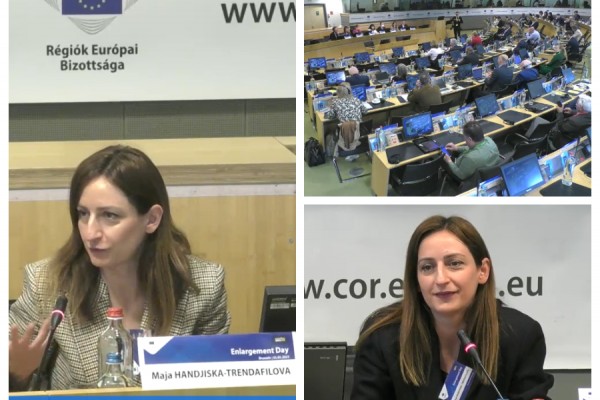
Handjiska-Trendafilova at the 8th EC Enlargement Day: Skills Development in Public Administration is Paramount for Accelerated Reforms in the Western Balkans
During the two-day European Committee of the Regions’ flagship event on EU enlargement policy dialogue and capacity-building, organized in cooperation with the Swedish Presidency of the Council of the EU, representatives of countries joining the EU, partner countries and other important players discussed numerous topics important for authorities dealing with the accession process. Participants discussed the revitalisation of the EU enlargement policy in 2022 and the key role of the local and regional authorities in implementing EU legislation. In this process, they are supported by the European Committee of the Regions (CoR) – the EU's expert body on multi-level governance and subsidiarity.
One of the crucial topics was related to the 2023 European Year of Skills, highlighting the importance of lifelong learning and gaining multifunctional skill assets, where the ReSPA Director contributed both days.
On the first day, the Joint Consultative Committees (JCC) and Working Groups that deal with the CoR's relations with individual countries elaborate through six meetings different approaches to the accelerated accession process and role of local and regional level. It was also an opportunity to explore what skills are needed at local and regional levels for the decision-makers (who face increasing demands to operate in line with EU rules and procedures), and citizens who are faced with issues such as brain-drain to the EU.
Under the Capacity lab Session “Skills that municipalities in North Macedonia need most”, ReSPA Director presented the unique ReSPA’s regional position in skilling up the capacities of the civil servants in the Western Balkans needed for accelerated reforms in public administration and accession process. In this context, Handjiska-Trendafilova pointed out three crucial aspects: the importance of building a systematic effort toward upskilling human capacities at the local and regional levels; activating various instruments of support for the civil servants based on their real needs in building up different skill sets needed to deal with challenges they face and finally to encourage even more partnerships that will accelerate peer-exchange and learning in the region. “ReSPA team is open and willing to support the region even more with various capacity-building activities that will respond to its urgent needs. Apart from the various capacity-building activities within our programme of work, we are ready to respond quickly with our on-demand support mechanisms to the administrations, to get the knowledge and skills needed for accelerated EU accession” underlined Director Handjiska-Trendafilova.
On the second day, under Session 2 “Topical debate linked to the 2023 European Year of Skills”, Director Handjiska-Trendafilova debated jointly with Ms Jasna Gabrič (Co-Chair of the JCC North Macedonia), Ms Fanny Marchal (Head of Unit of DG NEAR) and Mr Klas Klaas (Regional Manager EU Enlargement, Support for Improvement in Government and Management of SIGMA/OECD) on burning issues at the regional and local level regarding the skills development and how to deal with many challenges in this regards. They shared various perspectives on finding the efficient mix of measures to keep the people with the necessary skills in local communities and regions in accelerating their economic and overall development.
“Skills topics are “spot on” not only because of the 2023 Years of skills but because of the truly transformative impact that learning, unlearning, and relearning (especially in the area of digital and green revolution) have on the regional progress. We in ReSPA developed a wide set of instruments for building the capacities of the civil servants in the region because for us they are at the centre of everything – human capital is the backbone and the main asset that we are supporting in the Western Balkans public administration” highlighted Handjiska-Trendafilova.
In this context, Director Handjiska pointed out two sets of challenges: the first one relates to the very volatile and unpredictable context we are in, which requires many different skill sets (for instability, adversity, digital skills, foresight skills, sustainability, resilience and specialized skills). Above those skills, the local level needs additional ones such as skills for the sectoral policies and competencies they have, EU funds management, and horizontal ones. The second set of challenges relates to the realities the central and local communities face which are related to the resources and capacities, to balanced regional development, autonomy, optimal resource allocations, demographic challenges, etc. “In such a general context there is the risk that the aspect of skills development is relegated and we all need to think about what we can do to advance things” concluded Director Handjiska.



